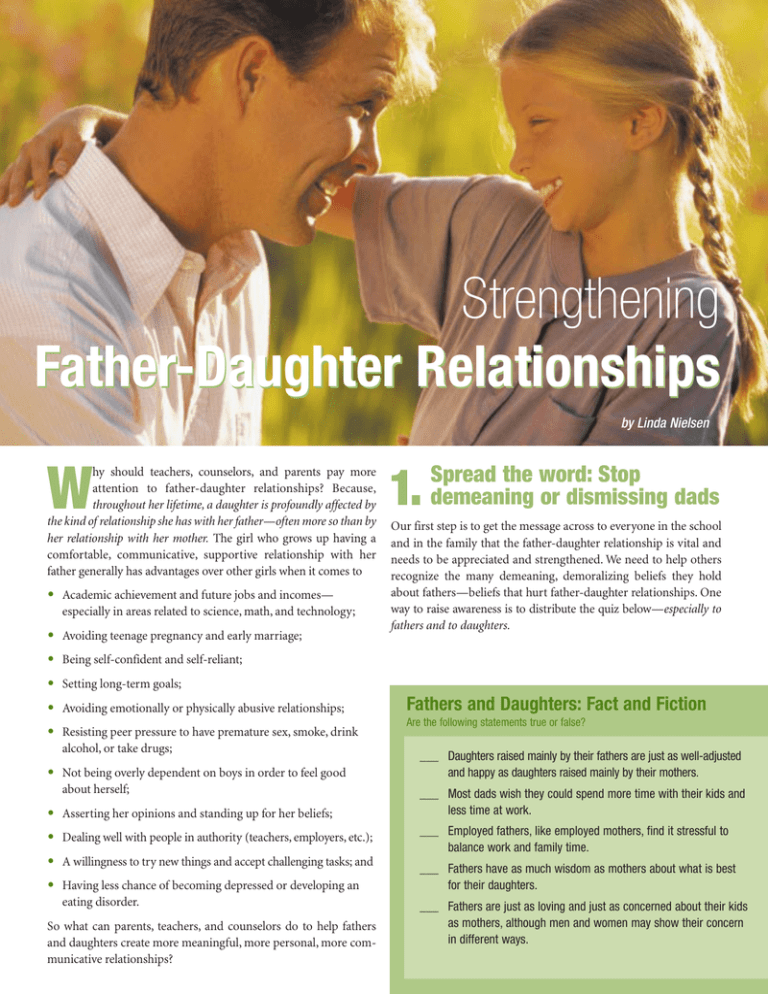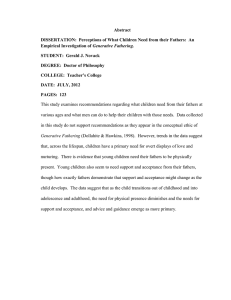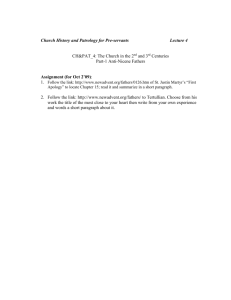W Father-Daughter Relationships Strengthening 1.
advertisement

Strengthening Father-Daughter Relationships by Linda Nielsen W hy should teachers, counselors, and parents pay more attention to father-daughter relationships? Because, throughout her lifetime, a daughter is profoundly affected by the kind of relationship she has with her father—often more so than by her relationship with her mother. The girl who grows up having a comfortable, communicative, supportive relationship with her father generally has advantages over other girls when it comes to • Academic achievement and future jobs and incomes— especially in areas related to science, math, and technology; • Avoiding teenage pregnancy and early marriage; 1. Spread the word: Stop demeaning or dismissing dads Our first step is to get the message across to everyone in the school and in the family that the father-daughter relationship is vital and needs to be appreciated and strengthened. We need to help others recognize the many demeaning, demoralizing beliefs they hold about fathers—beliefs that hurt father-daughter relationships. One way to raise awareness is to distribute the quiz below—especially to fathers and to daughters. • Being self-confident and self-reliant; • Setting long-term goals; • Avoiding emotionally or physically abusive relationships; • Resisting peer pressure to have premature sex, smoke, drink alcohol, or take drugs; • Not being overly dependent on boys in order to feel good about herself; • Asserting her opinions and standing up for her beliefs; • Dealing well with people in authority (teachers, employers, etc.); • A willingness to try new things and accept challenging tasks; and • Having less chance of becoming depressed or developing an eating disorder. So what can parents, teachers, and counselors do to help fathers and daughters create more meaningful, more personal, more communicative relationships? Fathers and Daughters: Fact and Fiction Are the following statements true or false? ___ Daughters raised mainly by their fathers are just as well-adjusted and happy as daughters raised mainly by their mothers. ___ Most dads wish they could spend more time with their kids and less time at work. ___ Employed fathers, like employed mothers, find it stressful to balance work and family time. ___ Fathers have as much wisdom as mothers about what is best for their daughters. ___ Fathers are just as loving and just as concerned about their kids as mothers, although men and women may show their concern in different ways. Feature 2. A Quiz for Daughters Encourage more father-daughter time Rate the frequency of the actions below using the following scale: 0=never, 1=rarely, 2=usually, and 3=almost always. We can also help daughters and fathers strengthen their relationships by seeing to it that they spend more time alone with each other—time without other family members around. As fathers and daughters spend more private time with one another, they have more opportunities to communicate honestly and comfortably about meaningful, personal matters. Not only mothers and stepmothers must be helped to feel more comfortable with this idea; teachers and counselors must also realize that it’s not weird or strange or inappropriate for a father and daughter to spend time alone with each other, even during the daughter’s teenage years. Here is one way fathers and daughters can become more comfortable spending time alone with each other and get to know one another on a more personal level. As a daughter, ask your father to choose 10 pictures of himself from different times in his life—especially his childhood and teenage years. Be sure to ask him to include a picture of his father. Then ask him to spend an hour telling you stories about the pictures—in a quiet place where the two of you can talk privately. 3. Help daughters develop positive relationships with their fathers As a parent, teacher, or counselor, you are in a position to help daughters understand how important their relationships with their fathers are and to help them recognize the ways in which they may be pushing their fathers away. Suggest that daughters take the quiz on the right in order to see how they may or may not be sharing those parts of themselves that will encourage more open and communicative relationships with their fathers. continued on page 6 ___ Many fathers are made to feel that they are not supposed to be as involved in their daughters’ lives as the mothers are, especially during their daughters’ teenage years. ___ In several areas of a daughter’s life, dad has more impact than mom. ___ Most adult daughters wish they had spent more time with their fathers while they were growing up. ___ I spend as much time alone with my father as I spend alone with my mother. ___ I talk directly to my dad instead of going through other people to communicate with him. ___ I go to my father for advice and for comfort about personal matters. ___ I ask my father questions about his life the way I ask my mother. ___ I share important parts of my life as much with my father as with my mother. ___ I make as much effort to get to know my father as I do my mother. ___ I encourage my father to ask me questions about my life instead of acting as if he is prying or interfering. ___ I am as open and honest with my dad as I am with my mom. ___ I invite my father to do things alone with me so that we have time to talk privately. ___ I show my father how much I appreciate him as a parent. ___ I let my father know that he has as much impact on me as my mother does. ___ Score out of 33 The higher her score, the easier a daughter makes it for her father to create a meaningful, relaxed relationship with her. As parents, teachers, or counselors, we can teach these kinds of behaviors to daughters, encouraging them to embrace their relationships with their fathers to the fullest. If your score is a 10, you answered correctly. According to recent research and national statistics,* each of these statements is true for the majority of people in our country today. Sadly, though, many people have beliefs about fathers that weaken or limit father-daughter relationships. By helping others separate the facts from the fiction about fathers, we help them recognize the ways in which they are limiting, or even damaging, father-daughter relationships. ___ If the parents are divorced, the daughter benefits most by spending as much time as possible with her father. ___ A daughter benefits most when she has as comfortable, as open, and as personal a relationship with her father as she has with her mother. ___ Total number of true answers (score out of 10) 5 *See references cited in Embracing Your Father: How to Build the Relationship You’ve Always Wanted with Your Dad, by Linda Nielsen. OurChildren March 2005 Feature Parents in particular—both moms and dads—can strengthen father-daughter relationships in the following ways: • Be sure dad spends at least two hours a week alone with his daughter. • Watch movies together about positive father-daughter relationships: Fly Away Home, To Kill a Mockingbird, A Soldier’s Daughter Never Cries, etc. • Read books that show fathers being just as competent as mothers in parenting their daughters. Books may include I Live with Daddy, by Judith Vigna; Night Shift Daddy, by Eileen Spinelli; and Two Old Potatoes and Me, by John Coy. Is Your School Strengthening Father-Daughter Relationships? • Watch commercials together with your daughter and talk about the ones that make the father look stupid or incompetent. The following quiz can help you see how effective your school is in promoting the father-daughter bond. • Visit the following fatherhood websites for more ideas: Rate the frequency of the activities below using the following scale: 0=never, 1=rarely, 2=usually, and 3=almost always. —Center for Successful Fathering, www.fathering.org —Dads and Daughters, www.dadsanddaughters.org ___ We have pictures of fathers interacting with daughters on our bulletin boards. —Divorced Fathers Network, www.divorcedfathers.com ___ We mail information about students to the divorced dads, not only to the mothers. —Mensight Magazine, www.mensightmagazine.com ___ Our library books are as much about dads as they are about moms. ___ We design certain events only for dads and daughters. —Menstuff, of the National Men’s Resource Center, www.menstuff.org —MenWeb/Men’s Voices magazine, www.menweb.org —National Center for Fathering, www.fathers.com ___ We offer special meetings or workshops just for fathers. —National Fatherhood Initiative, www.fatherhood.org ___ Our counselors gather as much information from fathers as they do from mothers. —National Fathers’ Resource Center, www.fathers4kids.org ___ Our counselors include dads as often as they include moms in discussions about their children. ___ We invite dads to classes as often as we invite moms. ___ We include photos of, or directly address, fathers and daughters in our print materials. ___ We include both parents in communications/ reminders to students, e.g.,“Tell your parents,” not “tell your mom.” ___ Score out of 30 The higher your school’s score, the better job your faculty and counselors are doing of strengthening fatherdaughter relationships and making fathers feel welcome and appreciated. —National PTA, www.pta.org/getmeninvolved Using these tools can do a lot to raise awareness of the importance of father-daughter relationships and help families create these loving and powerful bonds. OC Linda Nielsen, Ed.D., is a nationally recognized expert on father-daughter relationships. An adolescent psychologist and college professor for more than 30 years, she has been teaching the only college course in the country devoted exclusively to father-daughter relationships for 15 years. Through her course, media interviews, and website (www.wfu.edu/~nielsen), she helps fathers and daughters strengthen or reestablish their relationships, especially when parents are divorced. Her work has been widely cited in The Christian Science Monitor, on National Public Radio with Frank Stasio, and in a public television documentary on fathers and daughters to be released in June 2005. Nielsen is the author of Embracing Your Father: How to Build the Relationship You’ve Always Wanted with Your Dad (McGraw-Hill, 2004) and writes monthly columns for the websites of the Stepfamily Association of America, Parenting Bookmark, and the National Men’s Resource Center. 6 OurChildren March 2005



